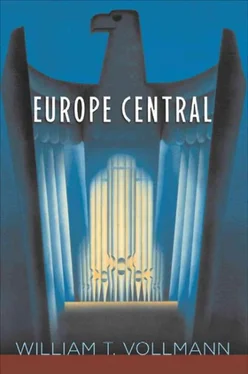So Dr. Kollwitz and his wife boarded the tramcar which carried them past a boarded up window in a four-storey flat, trees and birds, shadows near the river bridge; then came a flag battalion whose fourteen crimson banners spoke out against the big financiers who headed the Jewish hydra, and she thought she saw that man, that gaunt man who’d stood below her window grimacing under his tophat for all these years, but he wore a brown uniform now and his right arm touched the sky and he was shouting in ecstasy. Sounding its bell, the tram turned the corner, and before they even knew it they’d arrived at the Ostbahn Station. Leaning, hunched figures were begging on the steps; they could have crawled out of one of her etchings. Käthe gave them all the coins she had in her pockets, while Karl, smiling patiently and stroking his iron-grey beard, guarded the luggage.
They had one valise each. They bought their tickets knowing that we’d reimburse them. Then they went upstairs to the platform. The train came. Their seats were reserved. They stowed their luggage and sat down. And the train began to move. She’d never forget that slow-departing troop train, Peter waving to her from the window. The Kaiser had called merrily to the departing troops: Back home when the leaves fall!
A young girl with reddish-blonde bangs lowered the train window until she could rest her chin on it; she leaned, gazed, stretched and turned as fluidly as a newt. Karl adjusted the reading lamp for her. Käthe sat writing in her diary: And I must do the prints on Death. Must, must, must! She had always wanted to visit Russia.
The German boy who’d shared their compartment on the train, his slender legs crossed as he plucked half-consciously at his long raven hair, read Hölderlin, with a flask of water wedged beneath his arm. He suddenly realized that this doctor’s wife was somebody important; but by then it was too late.—Well, well, we think that Hölderlin or Kollwitz is a “choice,” but what is culture but a historically determined form of social organization?
The farther east they went, the colder it grew. By the time they crossed the border it was actually snowing.—It’s another world, said Karl.—Changing trains, waiting for their documents to be inspected, they arrived at the Byelorussian-Baltic Station three hours late, but a man in raspberry-colored boots was waiting for them on the platform. He led them into one of our black, flat-topped Russian automobiles whose chests sloped doubly down over the wheels, like the clasped mandibles of praying mantises; Karl helped her in, and although the car proceeded very slowly, on account of the ice, before they knew it, they found themselves exactly where they were supposed to be. The luggage got sent on to the hotel.
Karl had been hoping to stretch his legs; he’d been looking forward to a promenade on the Tverskaia, but was told that there wasn’t time, on account of the delay with the train. He looked sadly across the street into the window of a pastry-shop. Now here stood the curator, shivering and waiting. Here stood the pretty interpreter, who had long dark hair. The man in raspberry-colored boots, who seemed much taken with some private joke, waved goodbye and rode away with the driver. Then Käthe and Karl had to check their overcoats. Käthe was feeling a bit dizzy; she didn’t know quite why; Karl had to help her out of her coat. She had longed so much to be here, and now she hardly even felt curious. And she worried about doing something wrong, of leaving something important in her coat pocket, or somehow offending these Russians although they seemed so jolly—this interpreter, for instance, who must be nervous, for she kept trying so fervently to be welcoming that Käthe couldn’t think. The interpreter’s name might have been Elena; Käthe couldn’t remember anything the way she used to. Karl would certainly remember it, but how could she ask him when the girl stood right here? Never mind. The curator was twittering and beckoning. This husband who used to bring her red roses in bed, who wept when he saw her completed work, and who used to examine Peter in the consulting room, then share with her his every worry about the boy’s fragility, what a fine man he was! He murmured sweetly in her ear: I’m completely proud of you, Käthe.—She took his hand.
On the walls of the exhibition hall, her grief was already in place, framed and captioned: woodcuts in the main gallery, lithographs on the left, important etchings on the right, drawings in the other gallery; this was perhaps not exactly the way she would have done it, but the nervously ecstatic curator, who kept biting her nails, gazed on her so worshipfully that she had to express total satisfaction with the organization, selection and illumination of Käthe Kollwitz’s uncountable roundeyed, upgazing children, pallid figures leaning on their hands, pale and grimy women whose faces were lit by exploitation’s arc lamp. They were all real people whose tragedies were tied as much to life itself as to anything else: Grete, whose insanity had a strong sexual component and who at thirty was married and remained a virgin; Anna, who’d experienced bleeding and pain from constant sexual intercourse and who had considered suicide; that old Proletariarfrau who’d stood grim and angry outside the morgue after those two hundred and forty-four Communists were shot. In the midst of other agony-angled, grief-distorted compositions, her woodcuts loomed largest, with their gaunt pseudo-realism.
And here was an enlarged photoportrait of her from long ago. In her twenties she had strangely resembled Lenin’s wife, Nadezhda Krupskaya, who as it happened was only two years younger than she. Both women had the same intense eyes, the same lips clenched as if to hide their fullness. Käthe stared at her youthful self for a long time. For some reason, she knew not why, she dared not look at Karl.
They introduced her to the Soviet people, explaining: Her family was involved in the workers’ movement. So densely was the hall ornamented with her life’s work, and in such a loving fashion did all these Russians regard her, that she hardly knew who she was. They photographed her seated in the center of a gathering of our Soviet artists, her ancient eyelids drooping, young women leaning lovingly against her, light shining on the spectacles of painters, photographers and actors, a fellow from Meyerhold’s theater standing stiffly or ironically to one side, as if he knew that he wouldn’t be aboveground much longer. Karl stood self-deprecatingly out of the picture except when they called him. About him his poor patients remembered: The doctor came immediately, and his invoice never.
Another man in raspberry-colored boots who said he was an art critic pointed to one of her etchings and brusquely demanded that she explain it.
Well, Käthe said, that’s the typical misfortune of a worker’s family: A man drinks or gets sick, then he becomes a parasite or goes crazy, or kills himself. And then, you know, the woman’s misery is always the same.
But here that doesn’t happen anymore, because we’re all part of the collective.
I’m so glad, she said. It’s very, very good to be in a place where there’s actually hope!
The man nodded unsmiling and wrote something in a notebook.
They’d devoted an entire room to her Weavers’ Series, whose every wrinkle was dark, the ground made of fine lines, everything marching or progressing or fissuring: outstretched hands, bent bodies, fists grasping stones, dark houses with corpses on the floor, crazed widows reaching at nothing. This was the work whose gold medal had been vetoed by the Kaiser himself.
A proletarian woman cried out, very vigorously, but through the darkhaired interpreter, that since Frau Kollwitz had lost her son in the last war, she doubtless was at one with us in our unflinching class hatred.
Читать дальше












